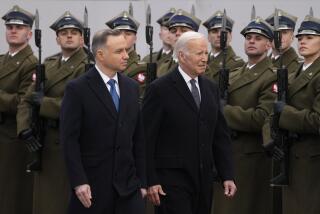Economic Shift a Hard Pill for Eastern Europe : Reform: Experts say the change to a market economy will be even more difficult than the job of rebuilding Europe after World War II.
- Share via
WASHINGTON — Western governments seeking to help the newly emerging democracies of Eastern Europe transform themselves into market economies are confronting a stark reality: For all the good that hard medicine can do, it does not go down easily.
“The transition will be longer and the sacrifices heavier than expected between these countries gaining political freedom and realizing their full economic potential,” Michel Camdessus, managing director of the International Monetary fund, said in a speech this week.
Moving into the second year of the region’s economic transformation, international economists say that the difficulty of the job ahead exceeds even that of rebuilding Europe after World War II. Not only do these countries need enormous infusions of investment, they lack such basic capitalist institutions as banking systems and markets.
IMF authorities this week approved loans worth $2.5 billion to Poland over the next three years. More than $800 million of that assistance will be used to pay the higher costs Warsaw faces in importing oil and gas.
The action by the IMF, which has taken a leading role in assisting Eastern Europe’s economic reforms, was the last and biggest piece of an $8.4-billion package of loans to Poland and four other Eastern European countries: Bulgaria, Czechoslovakia, Hungary and Romania.
The loans amount to a vote of confidence in the economic reforms that Poland is struggling to put into place. They are a prerequisite for assistance from other organizations and for a 50% reduction of Poland’s debt to the so-called Paris Club of major creditor nations.
The past week, too, saw inaugural ceremonies conducted at the London-based European Bank for Reconstruction and Development, a major new source of capital for the formerly communist countries.
And in a Warsaw building that once housed the Communist Party Central Committee’s library, brokers at desktop computers bought and sold shares in five formerly state-run ventures Monday, the opening day of trading in Poland’s new stock exchange.
“Clearly, the whole world is impressed by the fundamental transformation that the governments and people of these countries are bringing about,” Camdessus said.
While IMF officials insist that they are heartened by the progress so far, they concede privately that in some respects--such as production and inflation--the economies of Eastern Europe have fared even worse than expected after four decades of isolation from market forces. Private investment, meanwhile, is flowing in at no more than a trickle.
To understand the positive and negative aspects of building a capitalist system from scratch, IMF experts say, one need only look at the automobile industry in the former East Germany.
Consumers used to spend as long as 15 years on a waiting list to buy a car there. Often, they put their babies on the list at birth.
Now, with a good selection of Western automobiles available, no one is buying the sputtering Wartburgs and Trabants that once made up East Germany’s government-owned automobile industry. So last week, the last Wartburg rolled directly from an assembly line to a museum. And later this month, the Trabant, too, will wobble into history, leaving tens of thousands of Germans out of work until new investors can be found to take over the plants.
However, eastern Germany enjoys the advantage of having merged with a country that is the economic powerhouse of Europe. Other formerly communist countries, facing a similar mismatch between what consumers want and what their industries are capable of producing, have seen production drop drastically--as much as 12% last year in Poland and Bulgaria.
As workers lose jobs that their governments once guaranteed for them, the new political leadership of Eastern Europe is having to invest in a “safety net” that includes spending in such areas as unemployment insurance and job retraining.
At the same time, the nations of Eastern Europe have switched from trading within the Soviet-managed Council for Mutual Economic Assistance--the Comecon--to grappling with world prices. The marketplace has not been welcoming: The global economic slowdown and the run-up in oil prices during Iraq’s occupation of Kuwait battered the East. Czechoslovakia, for example, suddenly saw the cost of a barrel of oil rise to $35, up from $7.
With prices freed from government control and consumer demand unleashed, inflation exploded. In Poland, for example, prices rose 250% in 1990. As a result of Poland’s failure to bring it down, the IMF released only $500 million of the $700 million in loans it had approved last year.
More to Read
Sign up for Essential California
The most important California stories and recommendations in your inbox every morning.
You may occasionally receive promotional content from the Los Angeles Times.













